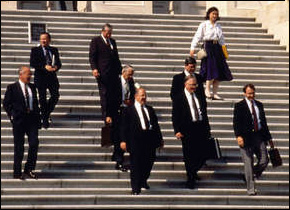OPINION
Business groups running up score in Olympia
In my six years in the State House, I never met a small business owner who wanted our state to fail.
Yet associations that represent businesses can’t seem to find anything nice to say about our state. Instead they talk down our economy.
After the National Labor Relations Board (NLRB) stood up for Washington jobs and charged Boeing moved 787 production to South Carolina in retaliation for strikes here, voices for business responded with outrage… against the NLRB.
Richard Davis, president of the Washington Research Council, called the NLRB position “malign nonsense.” Don Brunell, president of the Association of Washington Business (AWB), declared, “In truth, the move to South Carolina was a reasonable business decision[.]” The business-funded Freedom Foundation suggested Boeing consider saying “‘Screw it – we are so out of here’” and relocate “to a country that appreciates good-paying jobs.” As to the merits of the NLRB action, the Foundation sneered, “A little gub’mint cheese with your union-label whine?”
None of this is new. When Boeing decided to relocate its corporate headquarters to Chicago, the Washington Institute (now the Washington Policy Center) suggested it was because of Seattle’s property taxes. Hmm. Chicago has the highest sales tax rate of any big city and Illinois has an income tax.
During the Initiative 1098 debate we were assured by the initiative’s opponents that Washington has a great business climate precisely because it does not have an income tax. The voter’s pamphlet statement against I-1098 lovingly quoted a Seattle Times editorial that stated I-1098 “takes away the most important tax-based advantage Washington has in attracting business and jobs here: our lack of a state income tax.” Wealthy CEOs, many of whom bankrolled a push for education reform projected – by 2018 – to cost the state billions it doesn’t have, lined up to contribute huge checks against I-1098 and ensure the state’s coffers ran dry.
With I-1098 defeated, we now hear, again, from these same people that Washington has a terrible business climate. Unmentioned now are our state’s “advantages” such as no income tax or no punitive damages in tort law. Instead, we’re told, we now need to eviscerate a century-old workers’ compensation system that ranks 36th nationally in employer share-of-cost.
 Is it “anti-business” to question why the business community keeps moving the goalposts? As a guy who’s run a business association, and personally paid the business and occupation tax at its highest rate, I don’t think so.
Is it “anti-business” to question why the business community keeps moving the goalposts? As a guy who’s run a business association, and personally paid the business and occupation tax at its highest rate, I don’t think so.
I had a telling experience my first session. In 2005, I introduced a bill requiring the state to study giving Washington businesses a price preference in procurement. It also required the state to assess whether state contracts were “in the best interests of Washington state, its residents, and its economy.” For example, one factor to consider was to what extent would work under the contract “be performed at a location outside the United States[.]”
A bill putting Washington businesses first must have been deemed pretty business-friendly, right? Not so. The AWB, which also represents multinational corporations, declared it a “job-killer” and opposed it. After passing the House, with only five Republican votes in support, the bill died in the Senate.
The 2011 legislative session brought successes businesses can celebrate – whether it was the now-forgotten adoption of workers’ compensation reforms expected to save $218 million over four years, or the passage of a law that spared businesses from $352 million in unemployment insurance (UI) taxes.
The latter success came at the expense of an effort to help unemployed workers, too – with the AWB celebrating the “welcome surprise for the business community” of Senate Democrats breaking ranks to pass a business-only bill.
Reveling in the UI bill’s February signing, Brunell, at that time, threw caution to the wind and contrasted Washington’s solvent UI trust fund to California and 29 other states that “have exhausted their UI trust funds in the face of high unemployment and are borrowing from the federal government” (he didn’t mention “right-to-work” South Carolina is among those states).
What a difference a few months make. With the Legislature still in session, the down-on-Washington naysayers are back in full force – and the business community is anxious to extend their touchdown run beyond the end zone and up into the stands. When you’ve always got the ball you can never run up the score enough.
Brendan Williams is a former State Representative from the 22nd Legislative District.






